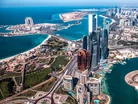How Abu Dhabi plans to double size of manufacturing sector

The last few years has seen the UAE up the ante on its industrial attractiveness.
This is especially true in Abu Dhabi, thanks largely to its focus on the sector.
Just a year after unveiling the Abu Dhabi Industrial Strategy (ADIS), a strategy aimed at accelerating the transformation of the manufacturing sector, the emirate has seen a 16.6% increase in the number of new industrial Rowad licences.
This brings the number of operational manufacturers in the emirate to 966, with total capital investments made by manufacturers operating in the emirate growing AED12.42 billion to AED384.06 billion.
Then, in July, the emirate announced plans to double the contribution of its industrial sector to its GDP over the next seven years.
Last year the industrial sector's contribution to Abu Dhabi's GDP grew 9.7% YoY to US$24.72 billion, according to government statistics, or 16.4% of its non-oil GDP and just over 8% of total GDP.
The goal? To increase this to US$46.8 billion by 2031.
So how are they planning to do this?
Investment of US$2.7 billion in six programmes
Just in the last week, the emirate unveiled plans to invest US$2.7 billion in six programmes with the aim of incentivising and facilitating businesses in growth and innovation and to attract both talent and investment.
As well as increase the emirate’s non-oil exports to AED178.8 billion by 2031, the programmes will create 13,600 skilled jobs, according to officials.
The programmes include Talent Development, Ecosystem Enablement, Industry 4.0, Circular Economy, and Homegrown Supply Chain Development.
“Abu Dhabi is undergoing a successful industrial transformation in line with the Abu Dhabi Industrial Strategy, which reflects the emirate’s ambitions to advance the sector,” says Salama Al Awadhi, Director of the National In-Country Value Programme at the Ministry of Industry and Advanced Technology (MoIAT).
Abu Dhabi’s ADIS strategy underlines the UAE’s goal to enhance its industrial sector amid regional competition to diversify from oil.
Last year the industrial sector's contribution to Abu Dhabi's gross domestic product grew 9.7% year on year to 90.8 billion dirhams ($24.72 billion), according to government statistics, or 16.4% of its non-oil GDP and just over 8% of total GDP.
"Oil is important to us in Abu Dhabi," Rashed Al Blooshi, undersecretary at Abu Dhabi's Department of Economic Development, recently told Reuters. "But investing in non-oil sectors will have a bigger impact on the GDP ... and we will sustain the growth."
Since 2021, the UAE has also established a strategy of negotiating bilateral trade agreements with a key aim to boost non-oil exports to global markets.
Abu Dhabi's non-oil GDP grew 6.1% in the first quarter, according to data from the statistics authority, outperforming overall GDP growth of 3.9% as lower oil prices weighed.
Featured Articles
SAP has announced it has appointed a new President for a newly-created EMEA region, aiming to make the most of the opportunities of cloud and AI
technology
From fighter pilot to fashion house financier, Mohammed Alardhi has taken Investcorp to great heights – so what’s the secret to his success?
Dr Omar Al-Attas, Head of Environmental Protection and Regeneration at Red Sea Global, shares his COP28 hopes and approach to regenerative tourism
strategy

